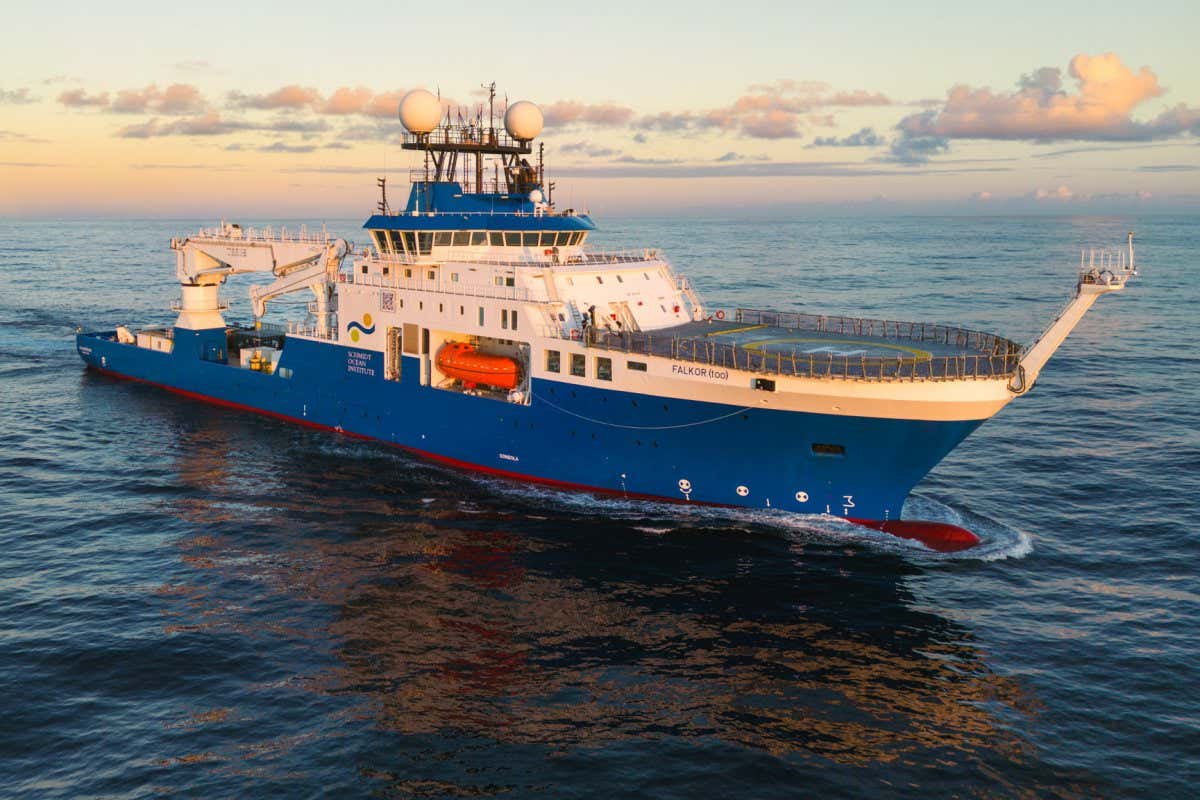New Life Forms Sought At Hydrothermal Vents: Research Ship Deploys

New Life Forms Sought At Hydrothermal Vents: Research Ship Deploys. Discover more detailed and exciting information on our website. Click the link below to start your adventure: Visit Best Website. Don't miss out!
Table of Contents
New Life Forms Sought at Hydrothermal Vents: Research Ship Deploys Cutting-Edge Technology
The search for extraterrestrial life often focuses on distant planets, but some of the most promising locations for discovering new life forms may be right here on Earth. A research vessel, the RV Atlantis, has embarked on an ambitious expedition to explore the deep ocean's hydrothermal vents, hoping to uncover unique and previously unknown life. This mission utilizes cutting-edge technology and promises to significantly advance our understanding of extremophiles and the potential for life in extreme environments, both on Earth and beyond.
<h3>Exploring the Deep: Hydrothermal Vent Ecosystems</h3>
Hydrothermal vents are underwater fissures in the Earth's crust that release superheated, mineral-rich water. These vents support unique ecosystems thriving in extreme conditions – intense heat, crushing pressure, and total darkness. Organisms inhabiting these environments, known as extremophiles, have evolved extraordinary adaptations to survive. Studying these extremophiles provides valuable insights into the limits of life and the possibilities of life in other extreme environments, such as those found on Jupiter's moon Europa or Saturn's moon Enceladus.
The RV Atlantis expedition focuses on several key hydrothermal vent fields, including:
- The Mid-Atlantic Ridge: Known for its diverse vent communities and unique geological formations.
- The Galapagos Rift: A region famous for its high density of hydrothermal vents and unusual life forms.
- The Juan de Fuca Ridge: An area known for its active volcanism and potential for discovering new species.
<h3>Advanced Technology for Deep-Sea Exploration</h3>
This expedition is equipped with state-of-the-art technology to explore the challenging deep-sea environment. Key technologies employed include:
- Remotely Operated Vehicles (ROVs): These underwater robots allow researchers to visually explore the vents, collect samples, and conduct experiments in harsh conditions.
- Autonomous Underwater Vehicles (AUVs): These unmanned vehicles can cover vast areas autonomously, mapping the seafloor and identifying potential vent sites.
- Advanced sensors: Sophisticated sensors will measure temperature, pressure, chemical composition, and other parameters critical for understanding the vent ecosystems. This detailed data will help researchers understand how these life forms thrive in such extreme conditions.
- DNA Sequencing Technology: Onboard laboratories will allow for immediate DNA sequencing of collected samples, enabling rapid identification of new species and the study of genetic adaptations.
<h3>The Potential for Discovery: New Species and Scientific Breakthroughs</h3>
The RV Atlantis expedition holds immense potential for scientific breakthroughs. Scientists anticipate discovering new species of extremophiles, expanding our understanding of biodiversity and the adaptability of life. The research could also reveal new metabolic pathways and biochemical processes, potentially leading to advancements in biotechnology and medicine. Specifically, research is focusing on:
- Chemosynthesis: Understanding how these organisms obtain energy from chemicals, rather than sunlight, is key to unlocking the secrets of their survival.
- Adaptation to extreme pressure: The pressure at these depths is immense. Studying how these organisms withstand this pressure could have implications for the design of deep-sea equipment and materials science.
- Novel enzymes: Extremophiles often produce enzymes with unique properties, potentially valuable for industrial applications and medical treatments.
<h3>Beyond Earth: Implications for Astrobiology</h3>
The findings from this expedition have significant implications for astrobiology – the study of life beyond Earth. By understanding the limits of life on our planet, scientists can better assess the possibilities of life existing elsewhere in the universe. The discovery of new extremophiles could provide crucial clues in the search for extraterrestrial life, particularly in environments similar to those found on other celestial bodies.
This groundbreaking expedition underscores humanity's ongoing quest to understand the origins and limits of life. Stay tuned for updates on the RV Atlantis's findings and the exciting discoveries that lie ahead. Follow our blog for regular updates and exclusive behind-the-scenes content from the expedition!

Thank you for visiting our website wich cover about New Life Forms Sought At Hydrothermal Vents: Research Ship Deploys. We hope the information provided has been useful to you. Feel free to contact us if you have any questions or need further assistance. See you next time and dont miss to bookmark.
Featured Posts
-
 Campeonato Carioca Bangu Vs Flamengo Data Horario E Onde Ver
Jan 24, 2025
Campeonato Carioca Bangu Vs Flamengo Data Horario E Onde Ver
Jan 24, 2025 -
 Rick Caruso Criticizes La Citys Handling Of Wildfires
Jan 24, 2025
Rick Caruso Criticizes La Citys Handling Of Wildfires
Jan 24, 2025 -
 Is Chiles Lithium Expansion A Risky Bet In A Saturated Market
Jan 24, 2025
Is Chiles Lithium Expansion A Risky Bet In A Saturated Market
Jan 24, 2025 -
 Calciomercato Napoli Veiga Il Nuovo Acquisto Dopo La Delusione Champions
Jan 24, 2025
Calciomercato Napoli Veiga Il Nuovo Acquisto Dopo La Delusione Champions
Jan 24, 2025 -
 Drama Di Swedia Twente Raih Kemenangan Atas Malmo
Jan 24, 2025
Drama Di Swedia Twente Raih Kemenangan Atas Malmo
Jan 24, 2025
